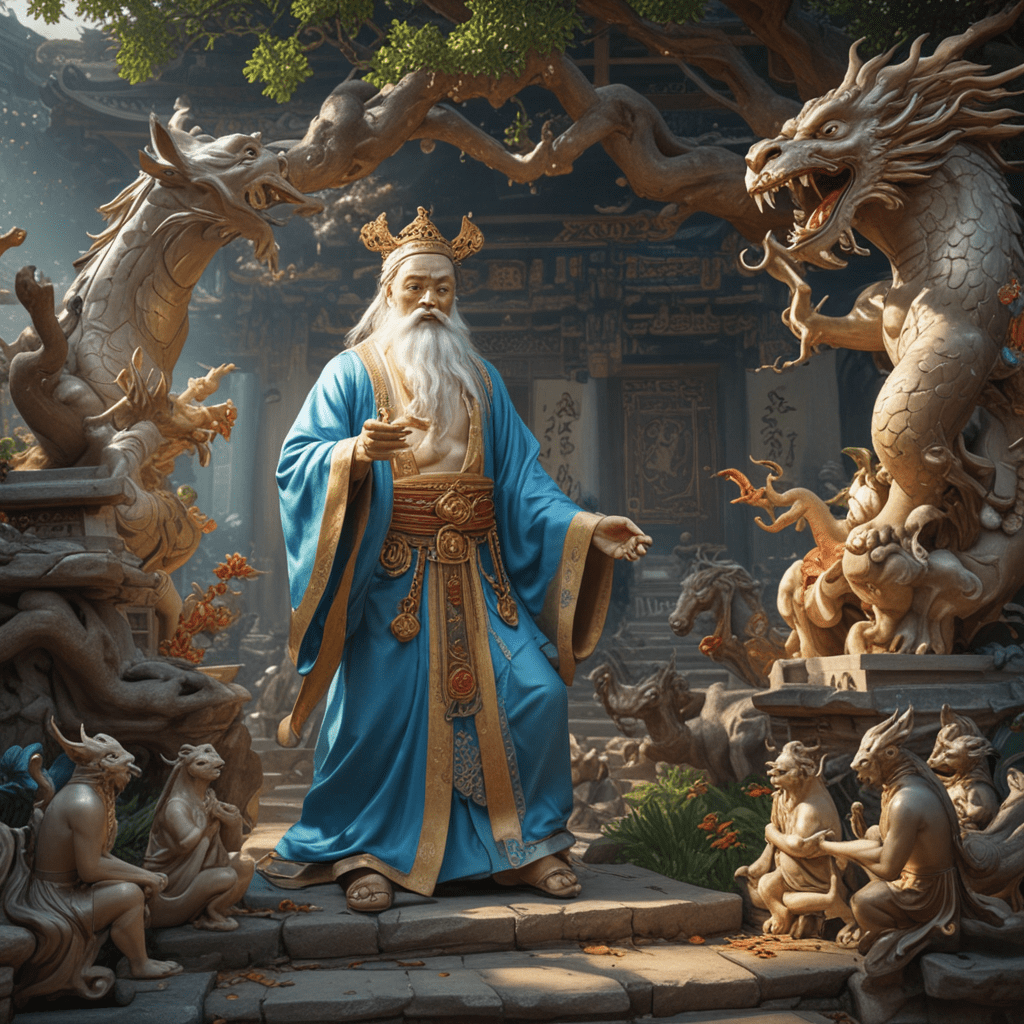The Ancient Myth of Pangu: The Birth of the Universe
The Chinese creation myth讲述s the story of Pangu, the primordial giant who emerged from the cosmic egg. As he grew, Pangu separated the chaos of the universe into heaven and earth. His breath became the wind, his voice the thunder, and his tears the rain. Pangu's sacrifice created the world as we know it, embodying the transformative power of chaos and the birth of order.
The Tale of Nuwa: The Creation of Humankind
Nuwa, the goddess of creation, is credited with shaping humanity from the yellow earth. Using her magical powers, she breathed life into the clay figures, creating the first humans. Nuwa's legend highlights the divine origin of humankind and the delicate balance between creation and destruction. Her story teaches the importance of compassion and the role of humans as stewards of the earth.
The Wisdom of Yu the Great: Controlling the Floods
Yu the Great, a legendary ruler and engineer, is known for his ingenious flood control system. Faced with devastating floods, Yu embarked on a long and arduous journey, dredging rivers, building dikes, and establishing drainage systems. His perseverance and determination transformed the landscape, preventing future calamities and safeguarding the well-being of the people. Yu's legacy stands as a testament to human ingenuity and the power of collaboration in overcoming adversity.
The Enlightenment of King Yao: Abdication for the Greater Good
King Yao, renowned for his wisdom and virtue, ruled with selflessness and compassion. Recognizing the importance of passing on the throne to a more capable successor, he abdicated in favor of Shun, a humble farmer known for his integrity. Yao's act of selflessness set a precedent for enlightened leadership and demonstrated the significance of putting the greater good above personal ambition. His story teaches the value of humility and the responsibility of those in positions of power.
The Story of Da Yu: Diligence and Determination
Da Yu, the son of Yu the Great, inherited his father's indomitable spirit and dedication to controlling the floods. He spent years tirelessly working on the project, never succumbing to discouragement or setbacks. Da Yu's perseverance and unwavering determination serve as an inspiration to all who face challenges. His story emphasizes the importance of hard work, resilience, and the belief in one's ability to overcome obstacles.
6. The Immortal Healer: Ba Xian's Journey to Enlightenment
Ba Xian, the patron deity of health and longevity, is a revered figure in Chinese mythology. His journey to enlightenment began with suffering and hardship. After being expelled from the celestial realm, Ba Xian endured numerous trials, including disfigurement and poverty. Through his trials, he gained wisdom and compassion, becoming a skilled healer dedicated to helping others. Ba Xian's story emphasizes the transformative power of adversity and the importance of perseverance on the path to enlightenment.
7. The Fable of the Four Sages: Seeking Wisdom through Nature
The Four Sages—Confucius, Laozi, Zhuangzi, and Mencius—were renowned philosophers and teachers who sought wisdom through observing nature and society. Their philosophies emphasized the importance of balance, harmony, and ethical conduct. The fable of the Four Sages teaches the value of learning from the natural world, as well as the importance of inner peace and self-cultivation. It encourages individuals to seek wisdom through introspection and the study of nature's patterns.
8. The Mythical Mount Kunlun: A Haven of Immortals and Wisdom
In Chinese mythology, Mount Kunlun is considered the abode of immortals and a sacred place of wisdom and enlightenment. It is said to be the source of the Yellow River and the birthplace of many mythological figures. The legend of Mount Kunlun symbolizes the remote and unattainable realms of wisdom and immortality, inspiring those who seek to transcend the ordinary and achieve spiritual growth. It represents the aspiration for a higher existence and the quest for knowledge beyond mortal limitations.
9. The Wisdom of the Yellow Emperor: The Foundation of Taoism
The Yellow Emperor, a legendary ruler and cultural hero, is regarded as the founder of Taoism. His teachings on harmony, non-action, and the balance of opposing forces have profoundly influenced Chinese philosophy and religion. The Wisdom of the Yellow Emperor emphasizes the importance of living in accordance with the natural order and cultivating inner peace and enlightenment. It teaches the path of self-realization through the union of body, mind, and spirit, providing a foundation for Taoist spiritual practices.
10. The Tale of Jiang Ziya: Teacher of Kings and Sage of Strategy
Jiang Ziya, a wise hermit and military strategist, played a pivotal role in the founding of the Zhou Dynasty. Known for his unparalleled knowledge and wisdom, Jiang Ziya guided kings and mentored heroes on their paths to success. The Tale of Jiang Ziya highlights the importance of strategic thinking, perseverance, and mentorship in achieving one's goals. It teaches the value of seeking wise counsel and embracing the power of collaboration to overcome obstacles and attain enlightenment.
FAQs:
Q: What are the key themes found in Chinese mythological tales of wisdom and enlightenment?
A: The key themes include the origin of the universe, the creation of humankind, the importance of perseverance, the value of humility, the power of collaboration, the transformative nature of adversity, the pursuit of wisdom through nature, and the aspiration for enlightenment and immortality.
Q: Who are some of the most notable figures in Chinese mythology associated with wisdom and enlightenment?
A: Prominent figures include Pangu, Nuwa, Yu the Great, King Yao, Da Yu, Ba Xian, the Four Sages, the Yellow Emperor, and Jiang Ziya.
Q: What lessons can we learn from these mythological tales?
A: The tales convey valuable lessons about the importance of embracing challenges, cultivating compassion, seeking wisdom from multiple sources, striving for self-improvement, and living in harmony with the natural world. They encourage us to reflect on our own lives and strive for enlightenment through perseverance, ethical conduct, and spiritual growth.


